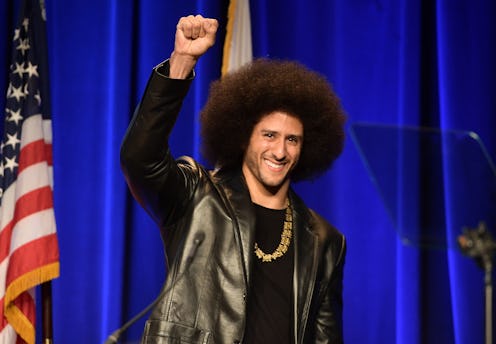News
Colin Kaepernick's Lawsuit Against The NFL Isn't Going Away — Here's What Comes Next

In a decision that will likely escalate the national conversation around sports as a platform for protesting social injustice, an arbitrator ruled Thursday that Colin Kaepernick's lawsuit against the NFL can move forward, according to The New York Times. The paper reports that while collusion cases against sports leagues are generally difficult to win, a hearing will most likely be set before the end of the year.
Since he became a free agent in March of 2017 — that is, no longer on contract with the 49ers — Kaepernick has not received any invitations to train with an NFL team, or been offered a new contract. In October, he filed a grievance against the NFL. The filing accuses the league of conspiring to "deprive Mr. Kaepernick of employment rights in retaliation for Mr. Kaepernick's leadership and advocacy for equality and social justice and his bringing awareness to peculiar institutions still undermining racial equality in the United States."
The NFL commissioner has previously said Kaepernick is not being blackballed by the league. "We've always invited Colin to come over," he told CNBC's Squawk Box in December 2017. "He's welcome to come over and meet at any point and time. We had an open door on that. There was some meeting set up with the player's coalition, and they were invited by the player's coalition." Bustle has reached out to the NFL for comment on Thursday's decision.
The former 49ers quarterback has been at the center of a polarizing national debate on political expression since 2016. At a game that September, Kaepernick kneeled during the national anthem to protest racial inequality and police brutality against black people.
"I am not going to stand up to show pride in a flag for a country that oppresses black people and people of color," he told NFL Media in 2016.
Since then, Kaepernick's peaceful protest movement has spread throughout the league, and even into other professional sports including women's soccer and major league baseball — but not without consequences. Kneeling athletes, and Kaepernick in particular, have been vilified by fans and onlookers who view the action as disrespectful to the American flag and the military.
Even President Trump weighed in, calling for NFL players who kneel during the anthem to be suspended, or even fired. "Wouldn’t you love to see one of these NFL owners, when somebody disrespects our flag," Trump said at a rally in Alabama last September "to say, 'Get that son of a bitch off the field right now, out. He’s fired. He’s fired!'"
In May, the NFL announced that players could stay in their locker rooms during the anthem as a form of protest, but that those who chose to kneel on the field would be fined. Shortly after, the chairman of the New York Jets announced he would be willing to cover the fines for any Jets player who opted to kneel.
Questions around whether Kaepernick is in fact being blackballed by the league continue to remain in the air. Last summer, in an interview with Sports Illustrated, multiple NFL team executives cited issues with Kaepernick's performance on the field as the primary reasons why he wasn't chosen to play this season.
If, in his full hearing, Kaepernick is able to demonstrate evidence a conspiracy and win his case, he is eligible to receive the money he would have earned had he been signed as a free agent.